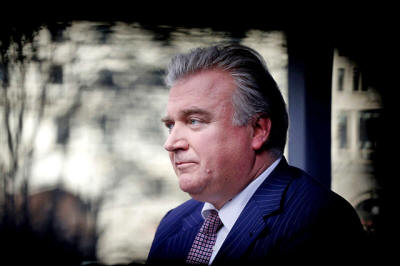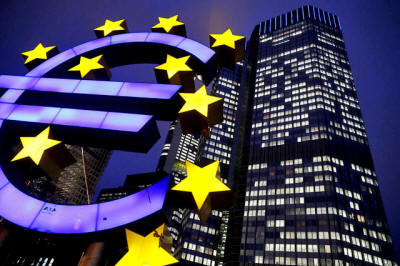
by Tyler Durden
February 18, 2013
from
ZeroHedge Website
As the European parliament attempts to create a
budget and Draghi repeats how the temporary lull in European growth
is merely a prelude to a growth renaissance in the second half of the year
(not to be confused with the verbatim lie
rehashed by European dignitaries in 2012, 2011, 2010 and 2009), it
appears a few leaks of truthiness are seeing daylight in the disunion.
In a shockingly frank interview, the CEO of Saxo
Bank describes the Euro's recent rally as illusory and that "the whole thing
is doomed," as the continent is not supported by a fiscal union.
As
Bloomberg reports far below, Lars Seier
Christensen says he would be a,
"seller of the EURO at anything near 1.40,"
noting that "right now we’re in one of
those fake solutions where people think that the problem is contained or
being addressed, which it isn’t at all."
Confirming that the only thing holding the farce
together is political not economic efforts, he sums the situation up
perfectly:
"people have been
dramatically underestimating the
problems."
Continuing,
Lars Seier Christensen, co-chief executive
officer of Danish bank Saxo Bank A/S, said the
euro’s recent rally is illusory and the
shared currency is set to fail because the continent hasn’t
supported it with a fiscal union.
“The whole thing is doomed,”
Christensen said yesterday in an interview at the bank’s Dubai
office.
“Right now we’re in one of those fake
solutions where people think that the problem is contained or being
addressed, which it isn’t at all.”
...
“I’d be
a bigger seller of the Euro at anything near 1.4,”
according to Christensen, who said he isn’t making any speculative
bets against the currency.
...
“Another possible fallout is getting rid of some of the countries
that are being ruined by being in the euro, notably the southern
European economies,” Christensen
said.
“People have been dramatically
underestimating the problems the French are going to get from this.
Once the French get into a full- scale crisis, it’s over.
Even the Germans cannot pay for
that one and probably will not.”
...
Record Debt
Public-sector debt is at record levels,
having more than doubled from 40 percent of gross domestic product in
2008.
The European Commission, which is due to
update its forecasts this week, sees it rising to 97.1 percent of GDP
next year.
“It’s the political world that has been extremely supportive of the
euro, not for economic reasons but for political reasons,”
said Christensen, a long-time critic of the single currency who now
lives in Switzerland.
Saxo Bank CEO Says...
Euro is Doomed as Currency Woes Resurface
by Mahmoud Kassem
February 18, 2013
from
Bloomberg Website
Lars Seier Christensen, co-chief executive officer of Danish bank
Saxo Bank A/S, said the euro’s recent rally
is illusory and the shared currency is set to fail because the continent
hasn’t supported it with a fiscal union.
“The whole thing is doomed,” Christensen
said yesterday in an interview at the bank’s Dubai office. “Right now
we’re in one of those fake solutions where people think that the problem
is contained or being addressed, which it isn’t at all.”

Saxo Bank A/S co-Chief Executive Officer Lars Seier Christensen said,
“Right now we’re in one
of those fake solutions where people think
that the problem is
contained or being addressed, which it isn’t at all.”
Photographer: Simon
Dawson/Bloomberg

The European Central Bank forecasts
the euro-area economy
will shrink 0.3 percent this year.
Photographer: Ralph
Orlowski/Bloomberg
The Euro has gained 8.2 percent versus the
dollar in the past six months and reached as high as $1.3711 on Feb. 1, the
strongest since Nov. 14, 2011.
The European Central Bank forecasts the
euro-area economy will shrink 0.3 percent this year and ECB President
Mario Draghi said on Feb. 7 that the currency’s gains pose a risk for
growth and inflation.
While the euro has strengthened, the economies of Germany, France and Italy
all shrank more than estimated in the fourth quarter.
Ministers from the 17-member euro area met
during the week to discuss aid to Cyprus and Greece as a tightening election
contest in Italy and a political scandal in Spain threaten to reignite the
region’s debt crisis.
“I’d be a bigger seller of the euro at
anything near 1.4,” according to Christensen, who said he isn’t making
any speculative bets against the currency.
The Euro declined 0.2 percent to 1.3332 against
the dollar, falling for a fourth day.
Shrinking Investment
France is grappling with shrinking investment, job cuts by companies such as
Renault SA and pressure from European partners to speed budget cuts.
While Germany expanded 0.7 percent last year,
France posted no growth and Italy probably contracted more than 2 percent,
the weakest in the euro area after Greece and Portugal, according to the
European Commission.
The economy is on the brink of its third recession in four years and the
highest joblessness since 1998.
Prime Minister Jean-Marc Ayrault said
Feb. 13 the country won’t make its budget-deficit target of 3 percent of
gross domestic product this year as the economy fails to generate growth and
taxes.
“Another possible fallout is getting rid of
some of the countries that are being ruined by being in the euro,
notably the southern European economies,” Christensen said.
“People have been dramatically
underestimating the problems the French are going to get from this. Once
the French get into a full- scale crisis, it’s over. Even the Germans
cannot pay for that one and probably will not.”
Cyprus Election
Cyprus has been shut out of debt markets for nearly two years with lenders
including
Bank of Cyprus Plc and Cyprus Popular Bank Plc
losing 4.5 billion Euros ($6 billion) in Greece’s debt restructuring last
year.
The nation is holding a presidential ballot
today where the economy is the main issue rather than reunification of the
divided island.
Spanish and Italian bonds rose last week as debt sales allayed concern the
nations may struggle to raise funds before Italy goes to the polls to elect
a new prime minister.
Yields on Spain’s 10-year bonds fell for the
first week in five as European Central Bank President Mario Draghi
said the country had achieved “enormous progress” in its reforms.
The spread between Spanish 10-year bonds and
comparable German securities decreased two basis points to 354 basis points.
Spain, which plans to sell three- and nine-month bills tomorrow and bonds
maturing in 2015, 2019 and 2023 on Feb. 21, faces a sixth year of slump.
Output is forecast to contract for a second year
in 2013 with unemployment at 27 percent amid the deepest budget cuts in the
nation’s democratic history.
Record Debt
Public-sector debt is at record levels, having more than doubled from 40
percent of gross domestic product in 2008.
The European Commission, which is due to update
its forecasts this week, sees it rising to 97.1 percent of GDP next year.
“It’s the political world that has been
extremely supportive of the euro, not for economic reasons but for
political reasons,” said Christensen, a long-time critic of the single
currency who now lives in Switzerland.
TPG Capital, the private equity firm
started by David Bonderman, bought a 30 percent stake in Saxo Bank in
August 2011 for about $560 million. Christensen and co-founder and co-CEO
Kim Fournais maintain majority ownership of the company.
The Hellerup, Denmark-based bank said in August that first half profit
dropped to 44 million kroner ($7.8 million) from 346 million kroner a year
earlier.


